Steering Innovation through Collaboration: Insights from the Clusters Meet Regions Event in Düsseldorf
The Clusters meet Regions event in Dusseldorf, North Rhine-Westphalia (NRW), took place from 8-9 November 2023 and focused on the transformative power of clusters in steering regional innovation towards a climate-neutral and digitally advanced future. It brought together a diverse array of experts and policymakers to discuss the role of clusters in fostering sustainable and technological advancement in the North Rhine-Westphalia region. The event was held on the premises of the Business Club Düsseldorf (Wirtschaftsclub Düsseldorf).
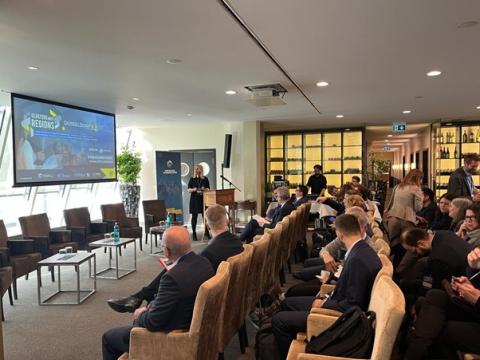
Morning Sessions: Setting the Innovation Scene
The day commenced with a warm welcome via video from Mona Neubaur, Minister of Economic Affairs, Industry, Climate Action and Energy of the State of North Rhine Westphalia. Setting the scene for the day ahead, Ms Neubaur outlined that ‘what we need is cross-sectoral and trans-regional cooperation between companies, higher education and scientific institutions. Cluster organisations are the central players to dynamize cooperation and innovation in Europe’.
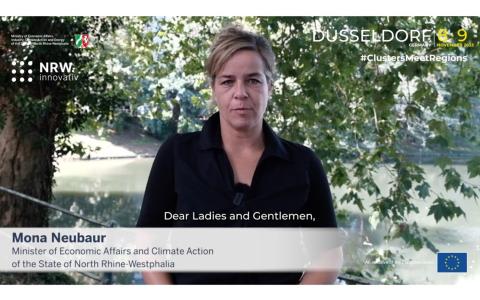
Dr Moritz Breul, Co-head of Unit – ‘Innovation Policy, Transformation of the Economy’ Ministry of Economy, Industry, Climate Protection and Energy of North Rhine-Westphalia followed, highlighting the vital role of clusters in regional development and transformation: ‘Clusters are very well-positioned to facilitate collaborative innovation dynamics’.
The welcomes were concluded with Jakub Boratyński, Director Networks & Governance, DG GROW, European Commission, who delivered a keynote speech emphasizing the critical role of cluster organisations in ensuring European resilience and twin transition objectives, outlining legislation relevant to clusters such as Net Zero Industry Act, Critical Raw Materials Act or Chips Act and expressing the critical importance of the current moment, ahead of the upcoming EU Parliament elections in 2024. On the topic of resilience, he stated: ‘The idea of strategic autonomy is of huge importance…Clusters are a very important part of the toolbox for agility and being able to respond quickly to these challenges’.
An Introduction to North Rhine-Westphalia
With the welcomes completed, Dr Jan-Philipp Kramer, Head of EU Services, Prognos, presented the ECCP input paper on North Rhine-Westphalia (NRW), displaying the region’s economic profile and cluster ecosystem. At a glance:
- NRW is the largest regional economy in Germany, with a GDP of €739 billion in 2021 (representing roughly 20% of Germany’s total GDP) and the second-largest exporter among federal states
- NRW’s GDP per capita boasts around €37,100 (PPS) (above the EU and slightly below the national average)
- 32 Cluster Organisations (CO) from NRW: 27 state-level clusters (Landescluster), 12 ECCP-registered COs
- NRW Clusters cover 10 out of the 14 EU Industrial Ecosystems
- Top 3 ecosystems: Digital, Energy-Intensive Industries, Mobility-Transport-Automotive/Electronics
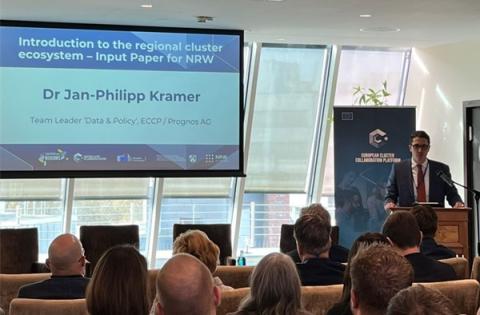
Fittingly, the following panel discussion focused on strategic and theoretic approaches to how cluster organisations can be enabled to support twin transition processes within regional innovation ecosystems. Antonio Novo, President of the European Clusters Alliance, moderated the talk featuring Marek Przeor, Team Leader, Industrial Forum, Alliances, Clusters (GROW.D.2), DG GROW, European Commission; Dr-Ing. Harald Cremer, CEO of the regional cluster Nanotechnology, Microtechnology, New Materials & Photonics (NMWP.NRW); Dr Reimar Molitor, CEO of Region Cologne/Bonn e.V., part of Regionen.NRW; Professor Dr Matthias Kiese, Institute of Geography of the Ruhr University Bochum, Expert on regional economics & clusters and Dr Jan-Philipp Kramer, Team Leader ‘Data & Policy‘, ECCP / Prognos AG. The emerging message from local speakers here was that the NRW region does not necessarily require more clusters (having achieved a high level of cluster maturity with many clusters already existing here), but instead the reconfiguration and possibly consolidation of its current set of clusters. The important facilitative role that clusters can play in transmitting regional needs to the world beyond was also emphasised here.
Before breaking for lunch was the pitching session. 7 pitches were heard from a range of interesting and innovative organisations across various ecosystems, from Hydrogen and renewables to mechanical engineering.
Afternoon Highlights: Practical Insights and High-Level Policy Discussion
The event's second half commenced with a matchmaking session where we facilitated a series of meetings for participants to find strategic sites of collaboration and opportunity with one another. A total of 21 bilateral meetings were conducted in the session.
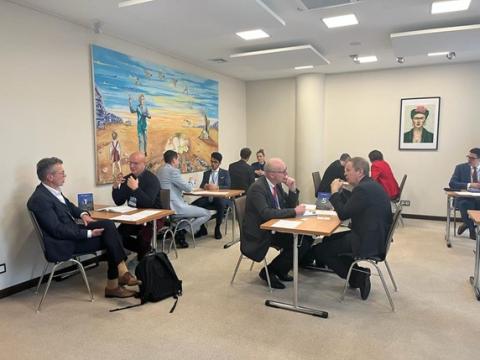
The day’s second panel discussion, moderated by Marek Przeor, featured Luc Hulsman, RIS3 Manager at the Northern Netherlands Alliance (SNN); Fabrizio Guarrasi, Innovation Manager at Lombardy Energy Cleantech Cluster; Andreas Mucke, Managing Director of the Circular Valley initiative and Norbert Reichl, CEO of the cluster Food-Processing Initiative. This panel was dedicated to discussing insights from regional practitioners. Luc Hulsman and Fabrizio Guarrasi presented success stories from their respective organisations, both centred on the theme of interregional collaboration in the context of the green transition. In the panel discussion itself, speakers agreed on clusters’ role as facilitators for SMEs to help them implement circular practices: ‘SMEs are willing to implement circular processes, but they don’t have the power because they are too small’ - Andreas Mucke, Managing Director of the Circular Valley initiative. Andreas went on to specify that clusters can fill this gap by bringing parties together, if necessary, across regions, for collaboration. It has also been stressed the unused potential of cross-sectoral collaboration between clusters as innovation lies at the crossroads of different industrial ecosystems. Panellists agreed there is a potential for finding common projects using the knowledge and experience of clusters represented at the panel such as: energy, agri-food, circularity, and hydrogen. Cross-sectoral collaboration is possible when it is built on trust and mutual understanding which clusters offer.
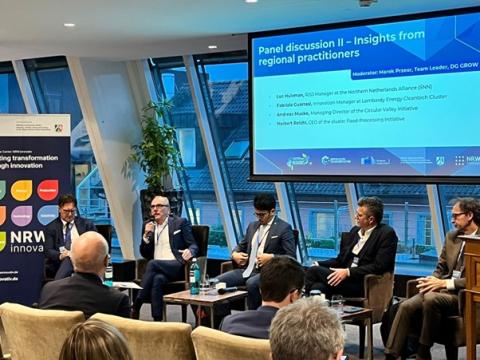
The day concluded with a high-level policy discussion led by Dr Nils Dülfer, NRW.innovativ/IMP³ROVE and including Dr Tobias Traupel, Head of Department “Europe, Law and Foreign Trade”, Ministry of Economy, Industry, Climate Protection and Energy of North Rhine-Westphalia; Dr Ole Janssen, Federal Ministry for Economic Affairs and Climate Action, Head of Department, “Innovation & Technology Policy” and Jakub Boratynski, Director Networks & Governance, DG GROW, European Commission. From a policy perspective, Dr Ole Janssen made it clear that cluster organisations are not objective in itself, but ‘are a great instrument’ for achieving the broader policy objectives of both prosperity and climate neutrality. Jakub Boratynski echoed this point, saying that ‘clusters are a tool whether we talk about industrial, regional, or research policy development or economic transition or skills upgrading’.
Day 2
On the second and final day of the event, participants had the opportunity to visit Thyssenkrupp Steel Europe AG, a steel plant in Duisburg. Five times the size of Monaco, the plant put a face to the industry discussed on the previous day. The focus here was on a movement away from traditional practices, with the decarbonising of steel production processes and acceleration of the uptake of renewable hydrogen. Participants were shown the blast furnaces and cooling towers, as well as a visit to the steelworks and hot strip mill units.
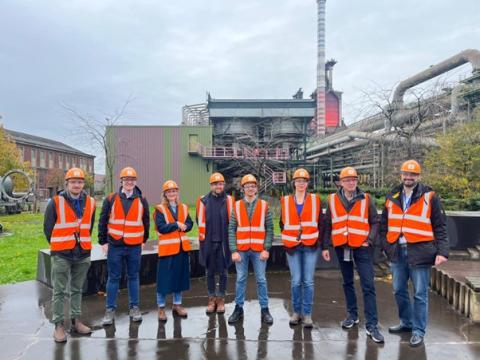
Reflections and Future Outlook
Throughout the event, speakers emphasized the significant role of clusters in facilitating collaborative innovation dynamics and acting as a model for business collaboration across ecosystems and regions. North Rhine-Westphalia perfectly demonstrated a region whose developed cluster ecosystem is leading the transition away from traditional industry and towards a greener, more prosperous future. The insights and discussions from the Clusters meet Regions event in Düsseldorf will undoubtedly shape actions, strategies and policies in North Rhine-Westphalia and beyond.
North Rhine-Westphalia clusters are encouraged to join the European Cluster Collaboration Platform to use the potential of the EU Single Market and collaboration with clusters from other EU countries.
📸 See more photos from the event on Flickr.
Clusters meet Regions Event - Düsseldorf, Germany
